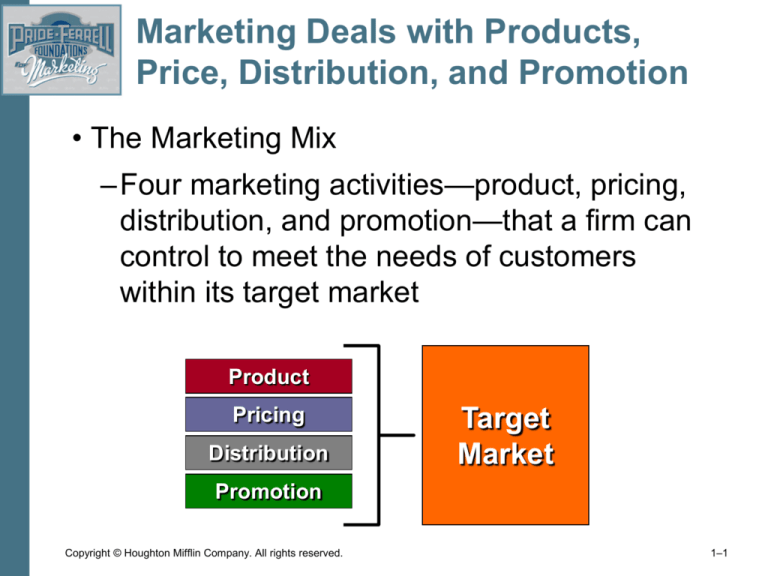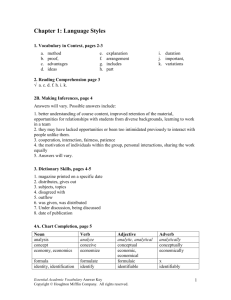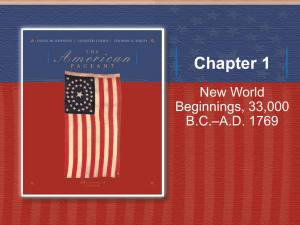
Marketing Deals with Products,
Price, Distribution, and Promotion
• The Marketing Mix
–Four marketing activities—product, pricing,
distribution, and promotion—that a firm can
control to meet the needs of customers
within its target market
Product
Pricing
Distribution
Target
Market
Promotion
Copyright © Houghton Mifflin Company. All rights reserved.
1–1
Customers Are the Focus
• Customers
–The purchasers of an organization’s
products; the focal point of all marketing
activities
• Target Market
–A specific group of customers on whom an
organization focuses its marketing efforts
•
•
•
•
Large or small customer groups
Single or multiple product markets
Single or multiple products
Local to global markets
Copyright © Houghton Mifflin Company. All rights reserved.
1–2
Marketing Mix Variables
Product
Goods, services, or ideas that satisfy
customer needs
Pricing
Decisions and actions that establish
pricing objectives and policies and set
product prices
Distribution
Promotion
The ready, convenient, and timely
availability of products
Activities that inform customers about
the organization and its products
Copyright © Houghton Mifflin Company. All rights reserved.
1–3
Important Terms
• Stakeholders
– Those constituents who have a “stake,” or claim, in
some aspect of a company’s products, operations,
markets, industry, and outcomes; these include
customers, employees, investors and shareholders,
suppliers, governments, communities, and others
• Marketing
– The process of creating, pricing, distributing, and
promoting, goods, services, and ideas to facilitate
satisfying exchange relationships with customers
and other stakeholders in a dynamic environment
Copyright © Houghton Mifflin Company. All rights reserved.
1–4
Important Terms
• Customers
– The purchasers of organizations’ products; the focal
point of all marketing activities
• Target Market
– A specific group of customers on whom an
organization focuses its marketing efforts
• The Marketing Mix
– Four marketing activities—product, price,
distribution, and promotion—that a firm can control
to meet the needs of customers within its target
market
Copyright © Houghton Mifflin Company. All rights reserved.
1–5
Important Terms
• Product
– Goods, services, or ideas that satisfy customer
needs
• Pricing
– Decisions and actions that establish pricing
objectives and policies and set product prices
• Distribution
– The ready, convenient, and timely availability of
products
• Promotion
– Activities that inform customers about the
organization and its products
Copyright © Houghton Mifflin Company. All rights reserved.
1–6
Satisfying Exchange
Relationships
• Exchange
–The provision or transfer of goods, services,
or ideas in return for something of value
FIGURE 1.2
Copyright © Houghton Mifflin Company. All rights reserved.
1–7
Conditions for Exchange
• Exchange Conditions
–Two or more participants have something of
value that the other party desires.
–Exchange provides mutual
benefit/satisfaction.
–Each party has confidence in the exchange
value of the other party’s offering.
–Each party must meet the
expectations of the exchange
to become trusted by the
other parties.
Copyright © Houghton Mifflin Company. All rights reserved.
1–8
Marketing Occurs in a Dynamic
Environment
• Marketing Environment
–The competitive,
economic, political,
legal and regulatory,
technological, and
sociocultural forces
that surround the
customer and affect
the marketing mix
FIGURE 1.1
Copyright © Houghton Mifflin Company. All rights reserved.
1–9
Components of Strategic
Marketing
FIGURE 1.1
Copyright © Houghton Mifflin Company. All rights reserved.
1–10
Understanding the Marketing
Concept
• Marketing Concept
–A philosophy that an organization should try
to satisfy customers’ needs through a
coordinated set of activities that also allows
the organization to achieve its goals
–Customer satisfaction
• Analysis of customers’ current and long-term
needs
• Analysis of competitors’ capabilities
• Integration of firm’s resources
Copyright © Houghton Mifflin Company. All rights reserved.
1–11
The Evolution of the Marketing
Concept
Production
Orientation
Late 19th century: efficient production of goods
allowed firms to meet strong customer demand.
Sales
Orientation
Mid-1920s–early 1950s: weakened demand
required that products would have to be “sold”
(personal selling, advertising, and distribution
became the focus).
Marketing
Orientation
Early 1950s–2000s: adopting a customer focus
means a commitment to researching and
responding to customer needs.
FIGURE 1.3
Copyright © Houghton Mifflin Company. All rights reserved.
1–12
Implementing the Marketing
Concept
• Becoming marketing oriented requires
– establishing an information system to discover
customers’ needs and using the information to
create satisfying products.
– coordinating all marketing activities
by restructuring the organization.
– obtaining the support of all
managerial and staff levels
in the organization.
Copyright © Houghton Mifflin Company. All rights reserved.
1–13
Managing Customer
Relationships
• Relationship Marketing
–Establishing long-term, mutually satisfying
buyer-seller relationships allowing for
cooperation and mutual dependency
• Increased value of customer
(loyalty) over time results in
increased profitability.
Copyright © Houghton Mifflin Company. All rights reserved.
1–14
Customer Relationship
Management (CRM)
• Using information about customers to create
marketing strategies that develop and sustain
desirable customer relationships
–Identifying buying-behavior patterns of
customers
–Using behavioral
information to focus
on the most
profitable customers
Copyright © Houghton Mifflin Company. All rights reserved.
1–15
Important Terms
• Exchange
– The provision or transfer of goods, services, or ideas
in return for something of value
• Marketing Environment
– The competitive, economic, political, legal and
regulatory, technological, and sociocultural forces
that surround the customer and affect the marketing
mix
• Marketing Concept
– A philosophy that an organization should try to
satisfy customers’ needs through a coordinated set
of activities that also allows the organization to
achieve its goals
Copyright © Houghton Mifflin Company. All rights reserved.
1–16
Important Terms
• Marketing Orientation
– An organizationwide commitment to researching and
responding to customer needs
• Relationship Marketing
– Establishing long-term, mutually satisfying buyerseller relationships allowing for cooperation and
mutual dependency
• Customer Relationship Management (CRM)
– Using information about customers to create
marketing strategies that develop and sustain
desirable customer relationships
Copyright © Houghton Mifflin Company. All rights reserved.
1–17
Value-Driven Marketing
• Value
– A customer’s subjective assessment of benefits
relative to the costs in determining the worth of a
product
• Customer value = customer benefits – customer costs
– Customer benefits
• Anything desired by the customer that is received in an
exchange
– Customer costs
• Anything a customer gives up in an exchange for benefits
– Monetary price of the benefit
– Search costs (time and effort) to locate the product
– Risks associated with the exchange
Copyright © Houghton Mifflin Company. All rights reserved.
1–18
Marketing Management
• Marketing Management
– The process of planning, organizing, implementing,
and controlling marketing activities to facilitate
exchanges effectively and efficiently
– Effectiveness
• The degree to which an exchange
helps an organization achieve its
objectives
– Efficiency
• The process of minimizing the
resources an organization must
spend to achieve a specific level
of desired exchanges
Copyright © Houghton Mifflin Company. All rights reserved.
1–19
Marketing Management (cont’d)
• Planning
– Assessing opportunities and resources
– Determining marketing objectives
– Developing a marketing strategy and plans for
implementation and control
• How, when and by whom are marketing activities
performed?
• Organizing
– Developing the internal structure of the marketing
unit
• Functions, products, regions, customer types
Copyright © Houghton Mifflin Company. All rights reserved.
1–20
Marketing Management (cont’d)
• Implementation
– Coordinating marketing activities
– Motivating marketing personnel
– Developing effective internal communications within
the unit
• Control
– Establishing performance standards
– Comparing actual performance to established
standards
– Reducing the difference between desired and actual
performance
Copyright © Houghton Mifflin Company. All rights reserved.
1–21
Important Terms
• Value
–A customer’s subjective assessment of
benefits relative to the costs in determining
the worth of a product
• Customer Benefits
–Anything desired by the customer that is
received in an exchange
• Customer Costs
–Anything a customer gives up in an
exchange for benefits
Copyright © Houghton Mifflin Company. All rights reserved.
1–22
Important Terms
• Marketing Management
– The process of planning, organizing, implementing,
and controlling marketing activities to facilitate
exchanges effectively and efficiently
• Effectiveness
– The degree to which an exchange helps an
organization achieve its objectives
• Efficiency
– The process of minimizing the resources an
organization must spend to achieve a specific level
of desired exchanges
Copyright © Houghton Mifflin Company. All rights reserved.
1–23



